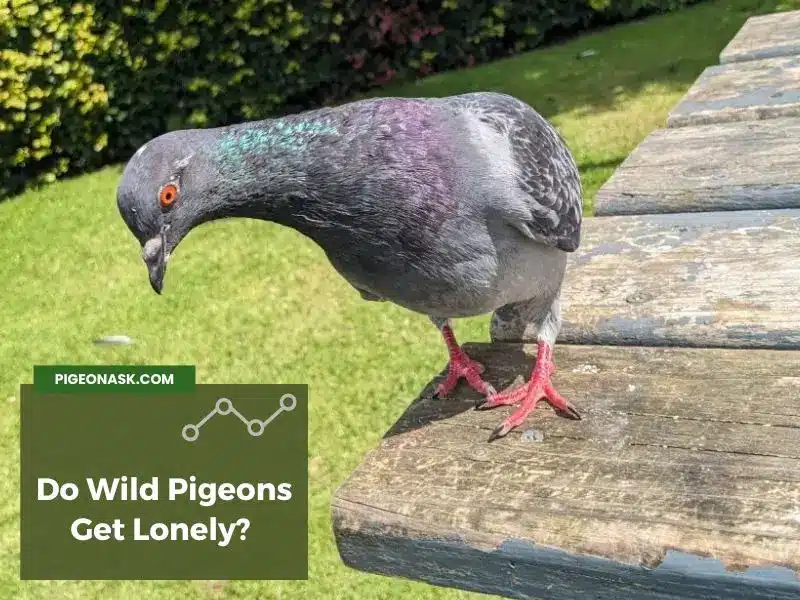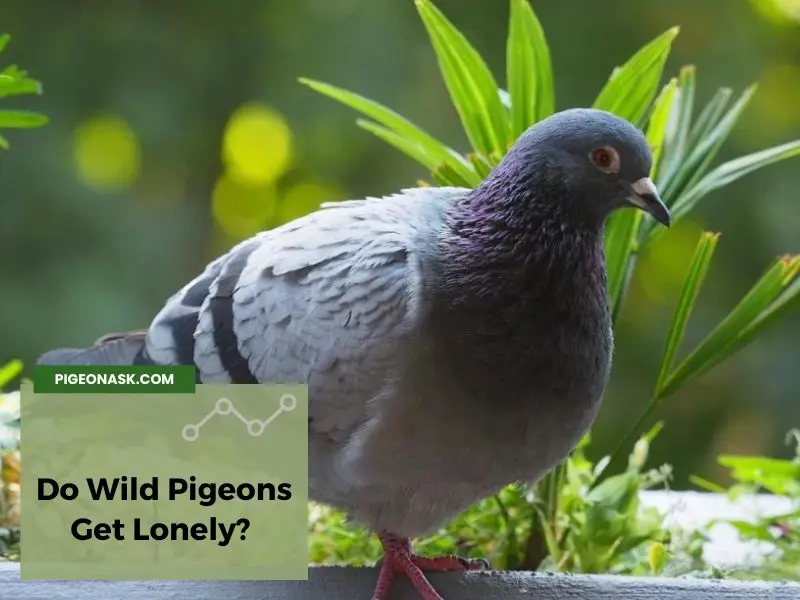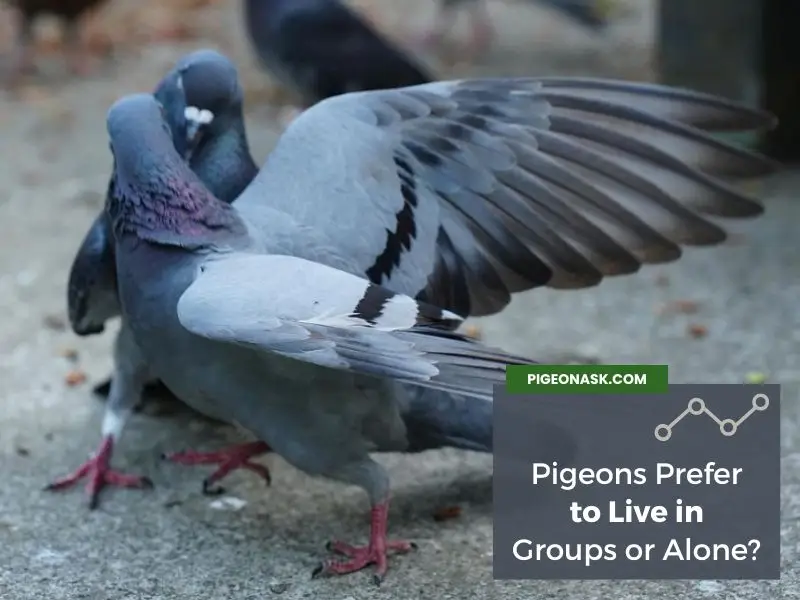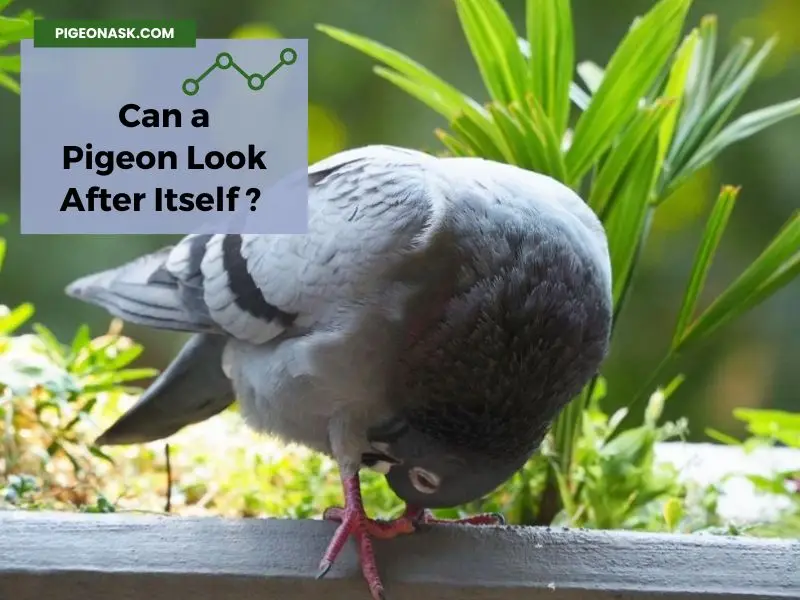Can Pigeons Live Alone? Keeping A Single Pigeon
Pigeons are seen in groups. This is due to the unique nature of pigeons and their codependency on flocks and mates. Pet keepers have always been on the fence about whether these sociable birds make suitable pets.
But have you ever wondered whether can pigeons live alone? It is a unanimous belief of all bird-keepers not to have pigeons as pets. Isolated and domestically raised pigeons are prone to experience depression and loneliness compared to wild ones. This may result in picking at feathers, plucking them, and other acts of self-mutilation, among other health issues.
And loneliness can, in extreme circumstances, be fatal. In this article, we’ll go over all the specifics regarding pigeons, their survival requirements, and how much social engagement affects their lives.
Interested in similar topics on:
Can Pigeons Survive Without a Mate or Flock?
Pigeons are naturally capable of surviving without being in a flock or with a mate. However, being accompanied by other pigeons increases their chances of a longer lifespan.
They are social and find comfort in the company of other pigeons. They learn how to search for food, make nests, and hide from predators through their social interactions.
So, is it normal for a pigeon to be alone and away from others constantly? Pigeons also have emotions like we do, which include loneliness. Pigeons need social connection, however certain ones prefer isolation while others seek for companionship. A pigeon rarely spends the majority of its time alone.
It should be pointed out that a pigeon is more prone to feel frightened and gloomy when it is removed from its flock. Without the safety net of a flock or a mate, pigeons suffer when finding food and shelter. So, keep a look out for wandering pigeons and offer them water, food, or a safe place to stay.
You can read our article about “Pigeon Habitat“
Do Wild Pigeons Get Lonely?
Yes, pigeons, both domestic and wild, can feel lonely. As mentioned, being social animals, they desire to be among other pigeons. When isolated, a pigeon’s stress levels rise due to the worry of finding food or shelter.

Do pet pigeons need friends, or are they better off alone? This depends on the pigeon’s affinity to social interaction. For instance, some pigeons are fiercely protective of their territory and may hurt other pigeons that approach them. You must keep an eye on their behaviour and respond to their requirements as the owner.
We highly recommend getting two pigeons if you plan to keep pigeons as pets. This will take the load off of you in monitoring their emotional needs, as their partners will keep their stress levels low.
Are Pigeons Monogamous, Polygamous, or Polyandrous?
Pigeons are generally monogamous. They spend their lives with a single partner with whom they share a highly committed mating bond. Unless their partner dies, they tend to mate with them for as long as they live.
So, are pigeons loyal to their mate? Yes, pigeons are devoted to their mates, and there are a number of reasons for this. These include –
Family Building
Raising a baby takes a village; even pigeons know this. Young pigeons are dependent on their parents when it comes to feeding. Having both parents makes sure a essential food supply for their growth and well-being.
Even before hatching, both male and female pigeons incubate their eggs from time to time. Nonetheless, they also work together to build a sturdy nest to protect them and the younger ones.
Safety and Reliance
Just like with flocks, pigeons benefit from having a mate by being codependent on each other. They pick up different tips from their partners, such as knowing where to find the most food or where predators live. Aside from co-parenting, they also share resources for nest building and food with one another.
Is It Healthy for Pigeons to Live Alone?
Pigeons are social birds that rely on social interaction with other pigeons through flocks or mates in order to thrive, so it’s not healthy for them to be completely alone. Isolating pigeons can pose serious risks to their mental and physical well-being.

Here are the major risks associated with pigeons living in isolation –
Depression
Without other pigeons to keep them company, pigeons spiral into depression through social deprivation. Eventually, this greatly impacts their physical well-being with multiple health issues such as feather plucking, biting, and other forms of self-mutilation.
Stress
Before the depression, pigeons that live on their own go through chronic stress. Almost all animals experience stress in a similar way, which includes frequent infections and illnesses, reduced immune function, and even a heightened risk of death.
Behavioral Problems
Most pet pigeons require constant behavioral correction from their owners. This is because they have high levels of anxiety and fear, which leads to aggression. Not only is this toiling for the owners, but hazardous for other pets or people around the house.
These problems are just the beginning. You’ll see that pigeons that have spent a lot of time alone have acquired eating problems, self-harming tendencies, violent mannerisms, and more.
Do Pigeons Prefer to Live in Groups or Alone?
As we’ve discussed before, being in flocks benefits pigeons by providing them with a sense of security in their large numbers, more access to food, and an outlet for social interaction. Flocks also help pigeons increase their survival by avoiding predators.

But pigeons have emotions and may occasionally desire to be alone. Again, this depends on the pigeon’s individual preference. Monitoring their social battery will give you a clear-cut idea of whether they prefer to be alone or are feeling lonely.
But how do you know a pigeon is lonely? Here are some common signs of a pigeon suffering from loneliness –
01. More Vocal
Cooing is normal for a pigeon, but constant loud vocalizations are out of the norm. When pigeons strongly desire social interaction, they are loud and make a continuous ruckus until their needs are met. These vocalizations aren’t meant to distress their owners but attract any pigeons around them.
02. Feather Plucking
When social deprivation pushes pigeons into the downward spiral of depression, they resort to self-harm as a coping mechanism to overcome their emotional distress. Feather plucking and biting are common self-mutilation acts that severely anxious pigeons do when they feel lonely.
03. Aggression
Pigeons that are constantly alone or have no experience being around other pigeons develop highly aggressive behavior. This stems from them being very territorial and dominating their own space. These behaviors include chasing, excessively flapping their wings, pecking, and biting.
04. Loss of Appetite
When experiencing anxiety, pigeons eat less as they are in fight or flight mode. Similarly, they also show a reduced interest in food and develop a poor diet when they feel lonely, as their need for social interaction overpowers their need to eat.
05. Social Withdrawal
Lonely pigeons may go cold turkey on social interaction. Their sudden withdrawal can be exhibited by them spending more time alone in higher-up places away from others. Pet pigeons may avoid their owners, while wild pigeons stay away from their flock and mates.
06. Lack of Activity
Pigeons are naturally adapted to be active as the search for food, mates, and nest materials requires them to fly around a lot. But, a lonely pigeon will show a visible decrease in activity. They spend their time being lazy due to a lack of motivation, either in solitude or one single spot without moving.
Can a Pigeon Look After Itself?
Yes, pigeons adapt to look after themselves once they learn how to fly. Since they are precocial, they have a fully developed sense of vision from birth and are quick learners in regard to walking and feeding themselves.

In order for pigeons to look after themselves, they need a few basic necessities, including –
01. Water and Food
Pigeons may consume a broad variety of foods since they follow an omnivorous diet, including both vegetables and insects. For pigeons to have a balanced diet, they need to have access to many foods. To relieve their thirst and maintain their hydration, they also require fresh water.
02. Shelter
Even pigeons want a personal space where they may sleep and raise their offspring. They are able to nest just about anywhere, from trees to buildings to specially crafted pigeon coops. A suitable shelter makes pigeons establish a sense of home, feel at peace and secure, and promote successful reproduction.
03. Protection from Predators
Owls, hawks, and cats are just a few of the many animals which prey upon pigeons. In the wild, pigeons gather in their flocks to avoid these predators, but this case is different inside houses. Pet keepers should make sure to separate their pets from their pigeons in order to avoid any harmful mishaps.
Given that a pigeon has all of the above-mentioned needs, it has a pretty good chance of fending for itself.
How Long Can a Pigeon Stay on His Own?
Pigeons pick up on self-survival adaptations from the moment they are hatched. Over time, they learn other habits from the flock. By the time pigeons are fully grown, they can stay on their own.
However, being alone from time to time and being completely isolated as a pet is not the same for a pigeon.
So, if you intend on keeping pigeons as pets, do pigeons need to be in pairs? We recommend keeping them in pairs, as raising baby pigeons together will keep the pigeon duo focused on a shared goal. This will reduce their chances of feeling lonely and depressed.
These are other factors outside of pairing/flocks that can affect how long a pigeon can stay on its own –
Age: Pigeons are babies up until they can fly without assistance, which is a span of 6 months from hatching. In this period, they are dependent on others for food and water.
Health: Sick, injured, or emotionally detached pigeons struggle with surviving alone and have co-dependency issues.
Environment: Pigeons that live in city areas find food easier, while pigeons in rural areas have to travel miles to scavenge.
Can a Pigeon Die From Loneliness?
Yes, a pigeon can die from loneliness. As we have mentioned before, depression from social deprivation leads pigeons to a number of health problems, including feather picking, plucking, and self-mutilation. When loneliness turns into chronic depression, this can lead to death.
You may have a pigeon that is suffering from severe loneliness if it –
- Has become withdrawn and less active
- Has stopped eating or drinking
- Started plucking or picking at its own feathers
- Became aggressive or fearful over little things
It is crucial to take action when a pigeon shows any of these signs. The pigeon can be given extra attention and stimulation, or you can try to introduce it to other pigeons. You might need to take the pigeon to a vet for assistance if it continues to exhibit the same problems.
Frequently Asked Questions
1. Can a single pigeon live alone?
Pigeons are capable of surviving and independent living. However, it’s crucial to remember that pigeons flourish in social settings and that extended seclusion can be harmful to their well-being.
Giving pigeons the opportunity to interact with others is highly advised because loneliness can result in behavioral difficulties and health problems.
2. Are pigeons social animals?
Pigeons are, in fact, sociable creatures. They rely on social interaction for many areas of their life, such as food gathering, nesting, and defense against predators.
3. Can pigeons be trained to live alone?
Pigeons must be trained to survive entirely on their own. They have a strong need to flock together and are sociable creatures by nature. To lead isolated lives goes against their nature. A pigeon needs social connection and a compatible flock or companion for their general well-being, even if it has been taught to live alone.
Conclusion
Answering the question, “Can pigeons live alone?” calls for a better comprehension of the social behavior of these unique birds. Although pigeons may adapt to live alone if required, it’s important to understand that they are, by nature, gregarious animals.
Loneliness in pigeons should not be taken lightly, as it seriously affects their mental and physical health. As a pigeon owner, it is important to closely monitor their emotional requirements to avoid this.
